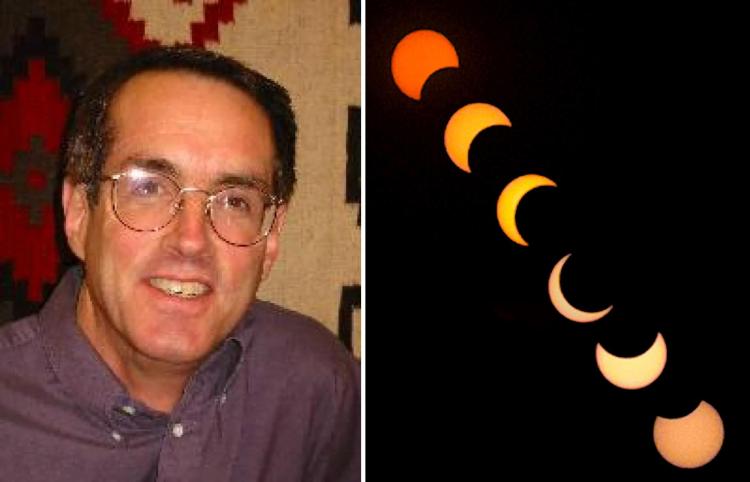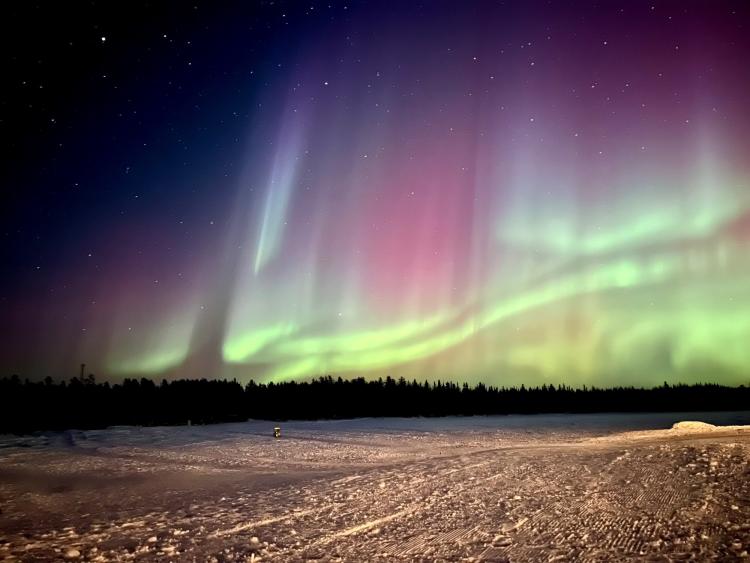The images were taken with a device that Doug Duncan invented to capture eclipses with a smartphone
Doug Duncan, an emeritus faculty member in the Department of Astrophysical and Planetary Sciences at the University of Colorado Boulder and the former director of the Fiske Planetarium, was recently among a select few recognized by the International Astronomical Union for their photos of the heavens.
The IAU’s Office of Astronomy for Education awarded prizes to about 30 people worldwide, including Duncan. The IAU said it selected the winners after receiving nearly 430 entries from 40 countries and territories worldwide for its third-annual astrophotography contest, which was judged by an international panel of astrophotographers and astronomy teachers.

Doug Duncan, an emeritus faculty member in the CU Boulder Department of Astrophysical and Planetary Sciences, made this award-winning solar eclipse photo with his smartphone.
“The images of the sky captured by enthusiast stargazers can leave one in awe, but they can also be important teaching tools,” the IAU notes. It adds that the organization “sought out images of the motions of the heavens: from the Sun’s path across the sky through the year to the movement of the stars in the night sky and the changing phases of Venus.”
Duncan received an honorable mention award for his photos of a solar eclipse, taken with his smartphone. Images taken with smartphones or other mobile devices was one of five IAU photo award categories.
Under normal circumstances, attempting to capture a solar eclipse with an unaided smartphone camera is a very bad idea, Duncan says, noting the sun’s rays can harm a smartphone internal workings in the same way that looking at the sun for extended periods can damage people’s retinas.

Jason Johnson made this award-winning photo of the northern lights on a CU Alumni Association Roaming Buffaloes trip organized by Doug Duncan. (Photo: Jason Johnson)
However, that was not an issue for Duncan, thanks to his use of the Solar Snap—a product he designed to safely capture photos of solar eclipses with a special eclipse-viewing lens that attaches to the smartphone’s camera lens and software that controls a camera’s zoom, focus and exposure. After about two years in research and development by Duncan, the Solar Snap is marketed by Bartlett, Tennessee-based American Paper Optics, which he says has sold about 50,000 Solar Snaps.
As for winning the astrophography award from the IAU, Duncan says, “It was a nice to be recognized. I’m particularly happy for the recognition it brings to the Solar Snap, which is the first invention I followed from the idea through completion. And people who use it are quite happy with it, so that makes me feel good.”
Duncan adds that he is just as happy that one of winning photos in the smartphones categories was taken by a participant in a CU Alumni Association Roaming Buffaloes trip that he organized last year to view the northern lights. Duncan said he was happy to give some photo tips to Jason Johnson, who won an IAU award for his photo "Northern Lights Color."
Meanwhile, Duncan is gearing up for his next Roaming Buffaloes trip, to witness a full eclipse next month in Texas, an event he is calling “Totality Over Texas.”
And after that?
“Well, I was thinking of retiring,” he says with a chuckle. “But the next total eclipse I’m focused on is in the summer of 2026 in Spain, pretty close to Barcelona and Valencia. And if an eclipse is happening in a really beautiful place, that’s when I’m very tempted to go.”
Did you enjoy this article? Subcribe to our newsletter. Passionate about astrophysical and planetary sciences? Show your support.



